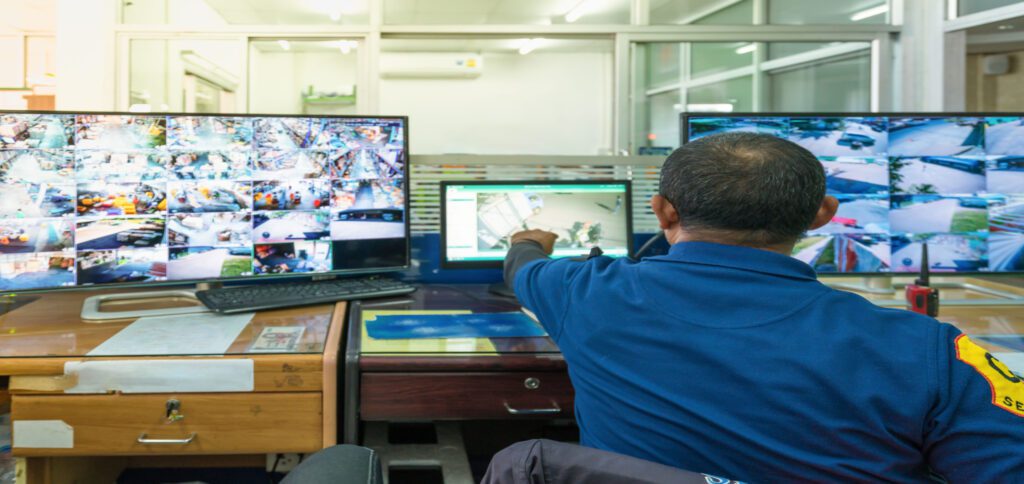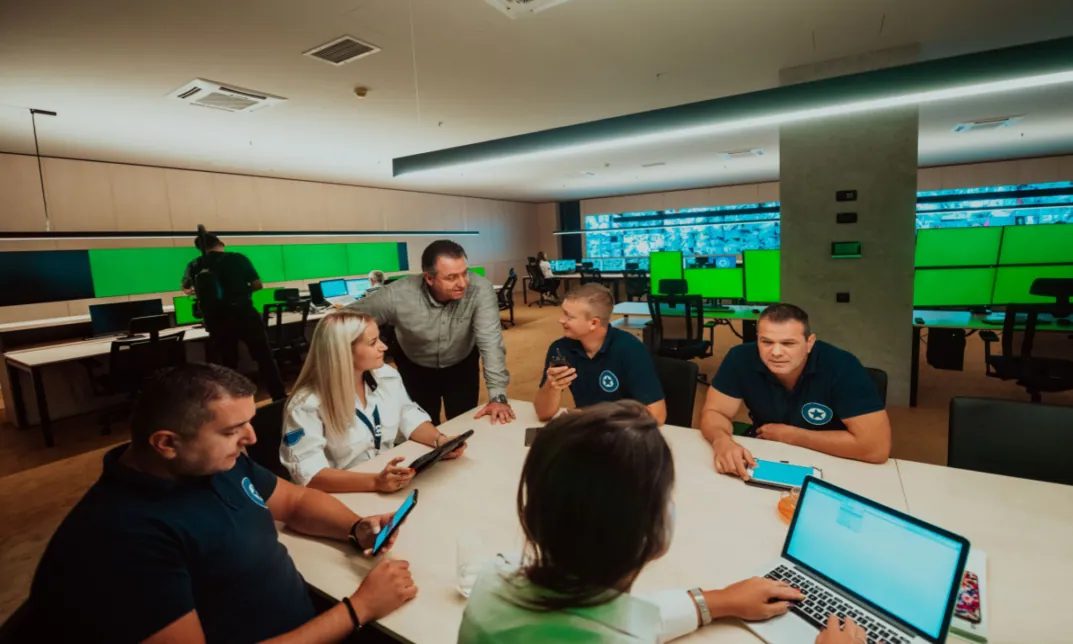A CCTV (closed circuit television) operator monitors and controls a bank of displays in a central control room. These are linked to security cameras installed in public spaces, buildings, and work sites. Thus, detecting and preventing crime and safeguarding people.
Table of contents
Moreover, CCTV operators play a vital role. That is, in ensuring security and monitoring in a variety of contexts. In this blog, we’ll dig into the world of CCTV operators, their roles, employment options, and much more. So, read further to find out!

What is a CCTV operator? And what is it like?
A CCTV operator is like a security guard who monitors areas using CCTV equipment. They must watch live video feeds and review recorded material to ensure everything is safe and secure.
Imagine it as being a safety detective. They identify anything out of the ordinary in real-time. Thus, respond immediately to restore order. They also examine recorded recordings to determine what triggered a crisis and gather proof.
The CCTV operator is quick if something seems to be correct. They alert the right people and devise a strategy for dealing with the problem. Hence, their go-to abilities include quick thinking and excellent communication.
Being a CCTV operator is a challenging job. Every day is unique. Thus, they must be prepared for everything. So, these operators must always stay sharp in a crowded public or private environment. Moreover, their technological skills, clever methods, and quick reflexes distinguish them.
What are the roles and CCTV Operator Responsibilities?
CCTV operatives play a critical role in ensuring security through their many tasks. Their duties include monitoring live channels and evaluating recorded material. As well as responding to questionable activity. Here’s a quick rundown of their roles and responsibilities:
- Monitoring Live Feeds: CCTV operators are in charge of monitoring real-time video feeds from security cameras. This constant focus helps them to identify and respond to security threats as soon as possible.
- Analysing Recorded Footage: CCTV operators check recorded footage besides live monitoring. This analysis is critical for analysing occurrences, establishing patterns, and giving helpful information. That is, to law enforcement if required.
- Rapid Reaction to Suspicious Activities: CCTV operators must respond when suspicious behaviour or security violations are identified. This may entail telling on-site security staff or contacting law authorities. Or, if in a dire situation, take immediate action to address the issue.
- Maintenance of Equipment: Another crucial responsibility is to check that the surveillance equipment is operational. CCTV operators regularly check and troubleshoot technological issues and collaborate with maintenance personnel. Thus, any flaws should be fixed as fast as possible.
- Law Enforcement Collaboration: CCTV operators work with law enforcement when their observations aid in criminal investigations. They may be able to provide important information and aid in legal proceedings relating to security events.
- Documentation and reporting: It is critical to keep track of events and activities. So, CCTV operators capture essential incidents. Thus, they can make reports or updates on various tracks. That can be for internal analysis, legal purposes, or as references to improve security operations.
- Communication Skills: Communication is critical for CCTV operators. During a security crisis, they may need to relay information in a straightforward manner. That is, to on-site security professionals, law enforcement, or other relevant parties.
- Adherence to Legal and Ethical Standards: Working within legal and ethical norms is critical. CCTV operators must know privacy laws, guidelines, and ethical issues. Hence, to ensure their activities are under legal requirements and industry standards.
Education, training and certification you will need
As you know, the roles and responsibilities of a CCTV. If you are someone who wants to embark on this epic career path. You will need to get the education, training and certification for that.
Background in Education:
While a specific degree is not always required. But you will need a high school diploma or equivalent, which is usually the minimum.
Moreover, some organisations may prefer you with a background in these courses. Hence, some courses include security management, criminal justice, or a comparable profession. Additionally, you can get those from our Unified Course at a very affordable price.
CCTV Operator Course:
Enrolling in CCTV operator training is strongly advised. These courses address critical issues. That ranges from camera operation, surveillance strategies, and the legal concerns of monitoring.
So, look for courses offered by respected schools or organisations in the security business.
Certification:
Obtaining a CCTV operator certification validates your skill set. Certification courses frequently include assessments. Thus, to guarantee a thorough grasp of surveillance technology and associated topics.
Titles such as “Certified CCTV Operator” or similar designations are examples of frequent certificates.
Professional Development on an Ongoing Basis:
CCTV operation is a dynamic industry with increasing technology and security standards. To be at the forefront of your field, engage in continuous learning, attend workshops, and stay current on industry news.
Hence, if you combine these with specialised training, you will be able to excel in the field of CCTV in operation. Moreover, you can go to our Unified Course for the best CCTV operator training course. Moreover, taking CCTV operator training from us will give you an overview of CCTV systems. As well as transmitting video signals, CCTV camera innovation, CCTV recording and archival, and many more.
About the CCTV operator jobs and job opportunities

CCTV operator jobs provide various options in the ever-changing security and surveillance industry. So, for anyone interested in working with CCTV, here’s a review of the employment market and potential CCTV operator job description:
- Increased Demand: Many companies’ growing focus on security has increased the demand for CCTV operators. Businesses, public venues, and private organisations have realised the value of good monitoring. This recognition has resulted in an ongoing need for trained professionals. Hence, the need for qualified individuals in the industry is constant. That indicates the critical role of CCTV operators. Thus, ensuring security across various industries.
- Public and private sectors: There are several opportunities in both the public and private sectors. Many government and business fields need a component CCTV operator. That is, to help them improve their security measures. Hence, you can explore several career routes in these fields. Thus, to maximise your talents in the evolving surveillance field.
- Career Advancement: CCTV operator positions are often used as stepping stones to further level up in security and surveillance careers. Professionals can advance to managerial positions or work in security management. And specialise in certain parts of surveillance technology. Thus, this career path allows professionals to improve their abilities. Moreover, it contributes to the changing security scene.
- Global Opportunities: Security issues remain a worldwide focus. So, trained CCTV operators have opportunities to work outside their home markets. International companies seek skilled professionals to help them with their security strategy. Hence, you can explore worldwide possibilities and use your skills in various situations. Thus, all while contributing to the larger picture of international security.
To summarise
To conclude, a job as a CCTV operator provides an exciting yet challenging route. There are many roles and responsibilities you will face during your CCTV operation. But fun careers are without their fair share of difficulties.
Moreover, if you receive the proper education, training, and dedication to the field. Hence, you can be someone who can make huge contributions to security and surveillance. Thus, you will be able to safeguard the safety and well-being of communities. Plus, be the protector when it comes to security. So, what are you waiting for? Join this exciting field as soon as possible to make a grand leap in this sector.




